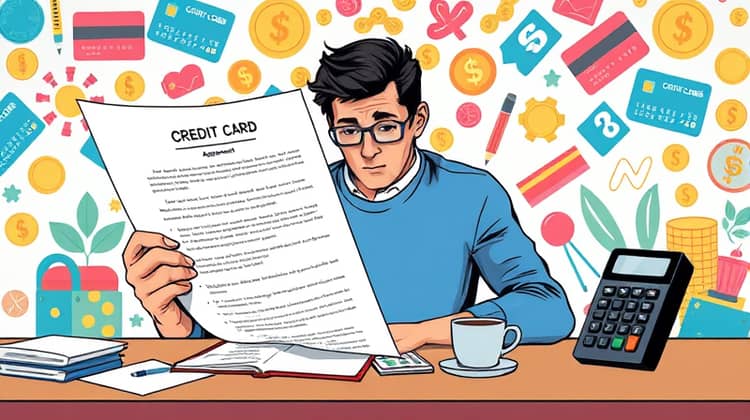Embarking on the journey of using a credit card for the first time can be both exciting and overwhelming. While credit cards offer numerous benefits such as convenience and rewards, they also come with responsibilities that must be understood to avoid potential pitfalls.
This article will provide you with seven essential tips to help you navigate your first credit card experience successfully. From understanding the basics to utilizing rewards effectively, these insights will equip you with the knowledge you need to make informed financial decisions.
1. Understand the Basics

Before you apply for your first credit card, it’s crucial to comprehend how credit works. A credit card allows you to borrow money up to a certain limit to make purchases or pay bills, with the expectation that you will repay that amount later, usually along with interest if not paid in full by the due date.
Your credit limit is determined based on your creditworthiness, which is assessed through your income, payment history, and credit score. The better your credit profile, the higher the credit limit you may receive, which opens opportunities for larger purchases. Understanding this basic mechanism sets the foundation for responsible credit card usage.
- Credit cards can help build your credit history.
- Timely payments positively impact your credit score.
- Overspending can lead to debt if not managed properly.
Grasping these fundamentals will prepare you for more informed decisions regarding credit cards, ensuring you use them to your advantage without falling into financial traps.
2. Choose the Right Card

Selecting the appropriate credit card is a vital step in your journey. There are numerous types of cards available, each offering different benefits, such as cash back rewards, travel points, or low-interest rates. Think about your spending habits and what features would benefit you the most.
You might also consider introductory offers, annual fees, and how the benefits align with your lifestyle. Some cards are designed for specific audiences, so being aware of your options will allow you to make a choice tailored to your needs.
- Look for cards with no annual fee if you’re just starting out.
- Consider cards that offer rewards aligned with your spending habits.
- Evaluate interest rates and fees associated with the card.
The right credit card can enhance your financial experience and help you achieve your goals, whether that’s building credit or earning rewards.
3. Read the Fine Print

One of the most critical tips for first-time credit card users is to carefully read the terms and conditions before signing up for a card. Many people overlook the fine print, which can contain essential information about fees, interest rates, and penalties.
Understanding these details can prevent unexpected charges and help you manage your credit card more effectively. Pay special attention to the annual percentage rate (APR), late payment fees, and balance transfer terms.
- Look for the APR for purchases and cash advances.
- Check if there's a grace period for bill payments.
- Be aware of foreign transaction fees if you travel often.
Taking the time to familiarize yourself with the card's terms will empower you to use it wisely and avoid costly mistakes.
4. Develop Good Spending Habits

Establishing responsible spending habits early on is critical for first-time credit card users. It's easy to succumb to the temptation of swiping your card, but treating credit cards like cash is essential for managing your finances effectively.
Set a monthly budget that allows for a reasonable use of your card, ensuring you can pay off your balance in full to avoid interest fees.
- Always track your spending to stay within your budget.
- Limit use of the credit card for necessary purchases.
- Establish a routine to review your transactions.
5. Pay Your Bill on Time

Paying your credit card bill on time is one of the most important actions to maintain a healthy credit score. Late payments can lead to hefty fees and can negatively impact your credit profile. Set reminders or automate payments to ensure you never miss a due date.
In addition to avoiding fees, timely payments help build your credit history, which is essential for future credit applications.
6. Avoid Maxing Out Your Card

Maxing out your credit card can have serious repercussions on your credit score and financial health. Even if you have a high credit limit, utilizing most or all of that limit can signal financial distress to creditors.
Aim to use less than 30% of your total available credit. This practice not only benefits your credit score but also promotes healthy financial behavior.
- Avoid making large purchases that exceed your limit.
- Keep your credit utilization low for better credit scoring.
- Use multiple cards to spread out your spending if necessary.
By staying within a reasonable usage limit, you can maintain a positive credit score and manage your finances more effectively.
7. Take Advantage of Rewards and Benefits

Credit cards often come equipped with rewards programs that can be quite advantageous. Whether it’s earning cash back, travel points, or discounts on products, take the time to understand how to maximize these benefits.
Know what actions earn you rewards and ensure you use your card for purchases that will provide the most return.
- Use your card for everyday purchases to accumulate rewards.
- Monitor your rewards balance and redeem points wisely.
- Stay informed about promotional offers and bonus opportunities.
Leveraging these offerings not only makes your purchasing more rewarding but also adds value to your overall credit card experience.














